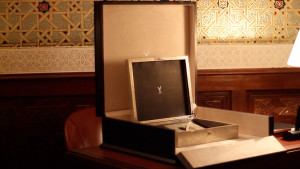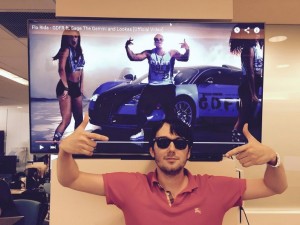Once Upon a Time in Shaolin, Pharma Bro Got Busted for Securities Fraud and the Wu-Tang Lived Happily Ever After?
Martin Shkreli’s arrest for securities fraud calls into question what will happen to his recent purchase of the Wu Tang’s special $2 million dollar album.
 Martin Shkreli is escorted from his Manhattan apartment by FBI Agents on December 17, 2015. Photo Credit: Reuters.
Martin Shkreli is escorted from his Manhattan apartment by FBI Agents on December 17, 2015. Photo Credit: Reuters.
BY: Zach Wilson, Guest Contributor
 On Thursday, December 17th, Martin Shkreli was stirred awake in his million dollar Manhattan penthouse to federal agents pounding on his door. He was placed under arrest and escorted past paparazzi in a grey hooded sweatshirt. His scheming had finally caught up with him. #Karma, Twitter retorted. 1
On Thursday, December 17th, Martin Shkreli was stirred awake in his million dollar Manhattan penthouse to federal agents pounding on his door. He was placed under arrest and escorted past paparazzi in a grey hooded sweatshirt. His scheming had finally caught up with him. #Karma, Twitter retorted. 1
Shkreli came from Brooklyn. He had blue collar roots, born April 1, 1983, to Albanian and Croatian immigrants who worked as janitors. He fancied himself an investment virtuoso, and interned at age 17 with the firm Cramer Berkowitz & Co (of CNBC Mad Money host Jim Cramer fame), where he “shorted” biotech stocks—a strategy that would become his bread and butter as he began his path down Wall Street.
“Shorting” a stock involves borrowing the stock, selling it, and then buying back the stock at a later time. Those who “short” stocks profit from price decreases in stocks. Shkreli frequently engaged in “shorting” biotech stocks, which he would then criticize on web forums frequented by investment analysts, creating uncertainty in the stock, an artificial price drop, and his own profits. Shkreli’s actions drew the ire of the Securities and Exchange Commission (“SEC”), the head federal securities regulator, which found no wrongdoing on Shkreli’s part.
Shkreli had honed and evolved his model—from a simple “short and trash” to more complex hostile takeovers aimed at price gouging orphan drugs to their breaking point.
Shkreli worked as an analyst and associate at various Manhattan investment firms before starting his own hedge fund, Elea Capital Management, in 2006. In 2009, he founded MSMB Capital Management. But the “shorting” strategy continued. In 2011, he notoriously filed requests with the Food and Drug Administration (“FDA”) to reject cancer treatments and inhalable insulin, all the while, shorting the stocks of the companies seeking FDA approval. Shkreli made massive profits, all the while, the companies fought to clear Shkreli’s hurdles, ultimately gaining approval.
Then Shkreli honed his comicbook villain alter ego—Pharma Bro. After years of working in finance, he began his own portfolio company, Retrophin Inc., which focused almost exclusively on purchasing biotechnology companies who focus on producing “orphan drugs”—lifesaving treatments for rare diseases that rarely have competitive alternative products. For example, Retrophin purchased the rights to produce the drug Thiola, which treats Cystinuria. Cystinuria is a rare inherited autosomal recessive disease affecting 1 in 20,000 people. It requires two defective chromosomes from both parents in order to be born with the disease, and causes chronic pain through kidney dysfunction that produces frequent kidney stones. There is no cure, and only the symptoms can be treated—commonly through a regimen of Thiola. Before Retrophin acquired the drug, tablets were around $1.30 each. After? Thirty dollars apiece. Shkreli had honed and evolved his model—from a simple “short and trash” to more complex hostile takeovers aimed at price gouging orphan drugs to their breaking point.
Pharma Bro was under investigation by the United States Attorney for the Eastern District of New York as well, for using Retrophin as his own “personal piggy bank”. . .
Around the time Thiola was purchased, those on the Retrophin board of directors began to quarrel with Pharma Bro, and decided to replace him with Stephen Aselage. The board also filed a $65 million shareholder derivative action against Shkreli, claiming that he had “repeatedly breach[ed] his duty of loyalty to Retrophin [,]” and misused the company’s funds by enriching himself at the company’s expense as well as “committing stock-trading irregularities and other violations of securities rules.”
Pharma Bro was also under investigation by the United States Attorney for the Eastern District of New York as well, for using Retrophin as his own “personal piggy bank” which he would shuffle funds from companies under his control to satisfy his shareholders. This shuffling stemmed from a 2011 Pharma Bro trade of Merrill Lynch stock that lost MSMB investors over $7 million. Pharma Bro did not acknowledge his failure to these shareholders, but instead, he allegedly engaged in a Ponzi scheme to shuffle funds from Retrophin to MSMB and hide his mistake.
Retrophin alleged in their complaint that Pharma Bro had defrauded MSMB investors, and then paid the MSMB investors by creating Retrophin and having it “enter into settlement agreements . . . to resolve claims about the returns they received on their MSMB investments.” Ultimately, according to the complaint, “Retrophin paid out $2.8 million in cash and issued 11,000 Retrophin shares, and Shkreli diverted an additional 47,610 Retrophin shares for the benefit of himself and his MSMB Funds, resulting in a benefit to him and to them of more than $4.5 million (at current market prices [then, as of August 14, 2015]).” The complaint alleges ten other schemes which are generally categorized as diverting Retrophin profits to MSMB shareholders using a variety of forms: sham “consulting agreements,” “loans” made from Retrophin to MSMB shareholders, using Retrophin to file litigation and breach its contractual agreements in order to profit from losses via “shorts,” which then were used to enrich Pharma Bro and pay back the allegedly defrauded MSMB investors.
Officially, Pharma Bro resigned. He responded to Retrophin’s complaint and allegations as “preposterous.” He moved on and founded Turing Pharmaceuticals, Inc, raising $90 million in a series A funding round. Turing profited—engaging in the same Pharma Bro tactics, infamously purchasing the manufacturing license for the AIDS drug Daraprim. The drug had been around since its FDA approval in 1953, and is used for treating and preventing malaria, as well as parasites in patients with weakened immune systems, notably AIDS patients. The patent for Daraprim lapsed in 1953, but there had been no generic version developed due to the rarity of the drug. Turing and Pharma Boy engaged their bread and butter—raising Daraprim’s price by 5,500 percent, from $13.50 to $750 per tablet in September 2015. This prompted drugmakers to rush to create a generic alternative to Daraprim when doctors complained about Turing’s hike. In the interim, Turing profited immensely. The evolution of Pharma Bro as a public villain was complete. 2
[Wu-Tang Clan’s] album would be kept in a Moroccan hotel vault, sold to a single buyer, and the buyer would have no right to commercialize the album . . .
Enter the Wu-Tang.
The Wu-Tang Clan is one of East Coast hip hop’s most prominent and timeless groups, formed in Staten Island, NY in the early 1990’s by Robert Fitzgerald Diggs, more well-known as RZA. The name comes from the 1980’s martial arts movie “Shaolin and Wu-Tang,” which exhibited the two styles of kung-fu and swordfighting, respectively. The group featured RZA, Ghostface Killah (Dennis Coles), GZA (Gary Grice), Inspectah Deck (Jason Hunter), Masta Killa (Elgin Turner), Method Man (Clifford Smith), Ol’ Dirty Bastard (Russell Tyrone Jones), Raekwon (Corey Quontrell Woods), U-God (Lamont Jody Hawkins), and Cappadonna (Darryl Hill). They have had a number of affiliates and associates and a long history of feuds, and relationships with other legendary hip hop acts. They have served as the influencers of modern day performers such as Drake and Kanye West. About.com ranked them as the Number 1 hip hop group of all time.
The Wu-Tang Clan has been on the cutting edge of hip-hop since its inception. However, sales of its 2014 release “A Better Tomorrow” only reached an abysmal 60,000 copies, a far cry from its two earliest releases—“Enter the Wu Tang” with 2.4 million copies, and “Wu Tang Forever” with 2 million copies. In a move that the group hoped would reward music purists and return the Wu to the apex of hip hop innovation, the release of its new album, “Once Upon a Time in Shaolin,” was announced in March 2014 with many restrictive conditions. The album would be kept in a  Moroccan hotel vault, sold to a single buyer, and the buyer would have no right to commercialize the album—meaning, to sell it en masse to the public for financial gain—for 88 years. The owner could release the album into the public domain, or could sell it with the same strings attached to another single subsequent buyer. Due to the restrictive conditions on the sale, the album was certified by Guinness Book of World Records to be the most expensive album of all time—attracting bids of over $5 million dollars. The album’s backup copies have all been destroyed, and the original “comes in a silver-and-nickel-plated box and jewel case. The package also includes a 174-page manuscript containing lyrics, credits and back stories on the production of each song, printed on gilded Fedrigoni Marina parchment and encased in leather by a master bookbinder.” The album also comes with $55,000 custom speakers to enhance the listening experience.
Moroccan hotel vault, sold to a single buyer, and the buyer would have no right to commercialize the album—meaning, to sell it en masse to the public for financial gain—for 88 years. The owner could release the album into the public domain, or could sell it with the same strings attached to another single subsequent buyer. Due to the restrictive conditions on the sale, the album was certified by Guinness Book of World Records to be the most expensive album of all time—attracting bids of over $5 million dollars. The album’s backup copies have all been destroyed, and the original “comes in a silver-and-nickel-plated box and jewel case. The package also includes a 174-page manuscript containing lyrics, credits and back stories on the production of each song, printed on gilded Fedrigoni Marina parchment and encased in leather by a master bookbinder.” The album also comes with $55,000 custom speakers to enhance the listening experience.
Some of the Wu-Tang members disliked RZA’s concept and fans started a Kickstarter campaign funded by microinvestments by fans to purchase the album and release it to the public domain, to no avail. The sale of the album was announced mysteriously—to a “private American collector.” The name of the buyer and price were later announced: Martin Shkreli for $2 million. Hip hop lovers everywhere mourned the loss of hip hop’s “Mona Lisa” to someone who admitted he hadn’t even listened to it within months of purchasing it, and planned to save it for a rainy day—or upon Taylor Swift’s request. While he hasn’t listened to the masterpiece, Pharma Bro has attempted to seek out and help out hip hop artists—giving an interview only hours before his arrest about helping to bail out Bobby Shmurda, an artist who—as his stage name suggests—had been arrested on murder conspiracy charges.
Perhaps even more bizarre than Pharma Bro’s hip hop listening, rapper freeing, Taylor Swift wooing habits is the ultra-secretive sales contract executed by the Wu. Twitter user Rob Wesley tweeted what was offered as a portion of the Wu-Pharma Bro sales contract that read:
“The buying party agrees that Once Upon a Time in Shaolin cannot be commercially exploited, as defined by previously agreed-upon language, until the year 2103, although the buying party may release the album for free or play it at listening parties during that time. The buying party also agrees that, at any time during the stipulated 88 year period, the seller may legally plan and attempt to execute one (1) heist or caper to steal back Once Upon a Time in Shaolin, which, if successful, would return all ownership rights to the seller. Said heist or caper can only be undertaken by currently active members of the Wu-Tang Clan and/or actor Bill Murray, with no legal repercussions. Please refer to Section 36 for an appended list of all current members.”
While it is unclear whether this is the actual contract or an internet hoax, actor Bill Murray is yet to make a statement regarding the contract, and RZA himself acknowledged the language in the tweet. Wu superfans like Ted Berg of USA Today have pressed Murray and the Wu-Tang lyricists to seize upon their moral obligation outlined in the purported contractual language. It wouldn’t be the first time the Wu had allegedly plotted a caper. Yet the origins of the language are doubtful: Wesley’s account is filled with other photoshopped jokes and fake quotes. Wesley also has yet to acknowledge the origins of his tweet. But members of the rap supergroup are not happy about being duped by Pharma Bro—who they mistook for a harmless “private collector.” Pharma Bro has ducked with the Wu-Tang Clan’s critiques of him, instigating what the hip hop world would call a “beef,” with flying expletives and demands for “respect.” All beef aside, while dubious indeed, the alleged contractual language quoted by Wesley is otherwise consistent with what had been publicly released about the great sale of “Shaolin” (albeit missing the language about Bill Murray and heists and capers). [ 3
[Shkreli] was arrested on December 17, 2015, and the fate of “Once Upon a Time in Shaolin,” is now, once again, undetermined.
Subsequent to Bill Murray’s inclusion, the saga took a new turn when Pharma Bro’s Retrophin-related financial machinations caught up with him. He was arrested on December 17, 2015, and the fate of “Once Upon a Time in Shaolin,” is now, once again, undetermined. A recently released article by The Atlantic’s David A. Graham details three ways in which the album can be freed from Pharma Boy’s villainous clutches: (1) asset forfeiture; (2) litigation-related expenses triggering a liquidation of Pharma Bro’s assets, including the album; and (3) a Retrophin-related money judgment triggering a seizure of Pharma Bro’s assets, including the album.
The first option is of particular interest to me personally. I worked this past summer as a summer intern at the United States Attorneys Office for the Eastern District of North Carolina, and worked on several asset forfeiture cases. Politically, the policy is somewhat controversial and involves a probable cause seizing of contraband or assets that are derivative from contraband. Upon the government’s showing that the property is more likely than not forfeitable, the presumption of innocence is flipped. These cases involve using the court’s in rem jurisdiction, or jurisdiction over the res, or “thing” that is within its geographic jurisdiction. The flipping of the presumption of innocence is premised upon a legal fiction that things do not have the same rights as citizens or natural persons. This results in the government suing property, and could end up in a case captioned: The United States of America v. Once Upon a Time in Shaolin.
The property itself is seized, and is the “defendant” in the forfeiture action. After publishing legal notice for the amount of time required under the Civil Asset Forfeiture Reform Act (“CAFRA”), all of those who have filed claims that they are the “innocent,” rightful owners of the property are “claimants” in the action, likely Pharma Bro in the case of “Once Upon a Time in Shaolin.” These are frequently defendants in a related or underlying criminal action, or their associates or family members. In an asset forfeiture case, if the government proves by a preponderance that the property is proceeds or is derived from proceeds of an offense, the claimant must prove by a preponderance of the evidence, that they are an innocent owner. The controversy arises in flipping the burden of proof on the property owner (rather than the government), and their difficult scenario of proving a negative—that the property was not wrongfully procured—to a “more likely than not” standard. The government can also use evidence gathered after a seizure or forfeiture complaint to satisfy its burden of proving that the property is more likely than not forfeitable. In short the government can seize now, prove later (within a reasonable time), and needs only show the property is “more likely than not” forfeitable.
In addition to this difficult standard, Pharma Bro needs to deal with a heightened securities fraud standard. The standard for securities fraud is outlined in SEC Rule 10b-5 which states that:
“It shall be unlawful for any person, directly or indirectly, by the use of any means or instrumentality of interstate commerce, or of the mails or of any facility of any national securities exchange,
(a) To employ any device, scheme, or artifice to defraud,
(b) To make any untrue statement of a material fact or to omit to state a material fact necessary in order to make the statements made, in the light of the circumstances under which they were made, not misleading, or
(c) To engage in any act, practice, or course of business which operates or would operate as a fraud or deceit upon any person,
in connection with the purchase or sale of any security.”
The Supreme Court case of TSC Industries, Inc. v. Northway, Inc. further defined the word “material” in regards to an omission: “an omitted fact is material if there is a substantial likelihood that a reasonable shareholder would consider it important in deciding how to vote.” The case likely turns on whether Pharma Bro’s alleged omissions to MSMB investors about the Merrill Lynch trade, as well as the activity Pharma Bro executed on Retrophin’s behalf to pay back MSMB investors, was “material.” Since omissions are equally as damning as misleading statements, Pharma Bro faces an uphill climb against this shareholder-friendly standard.
The interplay between these two standards could yield some interesting results. If an asset forfeiture action is initiated against the album, the main barrier would be the traceability of the album as an asset of Pharma Bro. The government would have to show that more likely than not, the album was forfeitable or wrongfully procured from dirty Retrophin money. Then, Pharma Bro would have to affirmatively show that “Once Upon a Time in Shaolin” was not the proceeds of his securities fraud, and that he was an “innocent owner.”
The government would seek to rebut this affirmative defense, and the multiple related actions would be thorny for Pharma Bro and his legal counsel to balance. On the one hand, he has to show that his omissions were immaterial in his securities fraud case—which usually involves releasing the information which was omitted. On the other, he has to attempt to prove that the album was purchased with “clean money” that was not proceeds of his securities fraud. The timeline of the two actions also makes balancing difficult—the criminal and civil securities fraud cases against Pharma Bro have already been initiated and any asset forfeiture of the album would occur during or after these actions—when the facts of the case have already developed and perhaps shown the mysterious origins of the funds used to purchase “Shaolin.” Even if the criminal case ends with Pharma Bro victorious, civil asset forfeiture can proceed on the lower “more likely than not” standard.
FBI’s New York office has tweeted that it does not have the album at this time, and that no seizure warrant had been granted—only an arrest warrant
The saga of Pharma Bro and the Wu-Tang is ongoing and fluid, but the facts so far support a possibility of future forfeiture, but forfeiture is not immediately imminent. FBI’s New York office has tweeted that it does not have the album at this time, and that no seizure warrant had been granted—only an arrest warrant. But this lack of a seizure warrant does not bar a later seizure of “Shaolin.” Pharma Bro’s indictment included a routine forfeiture note—a glimmer of hope to Wu-Tang fans—“The United States gives notice to the defendants that, upon their conviction of any of the offenses charged . . . the government will seek forfeiture . . . of any property, real, or personal, which constitutes or is derived from proceeds traceable to any such offenses.”
The indictment’s note also states that if the property that is proceeds of the offense cannot be found, the government will seek to forfeit any other property of the defendants up to the value of the proceeds of the offense. In short, if Pharma Bro is found guilty of securities fraud, “Shaolin” can be seized if it is (or is derived from) proceeds, or if the proceeds of Pharma Bro’s securities fraud cannot be found. In Pharma Bro’s case, the complexity of his schemes could come back to haunt him—the money he made off of the backs of Retrophin shareholders is likely long gone, due to its liquidity. It can be quickly moved and transferred into and out of different accounts be they within his personal assets, or dispersed to unknowing MSMB investors as “settlements.” The complexity of Pharma Boy’s schemes also work against him: once done, the schemes are difficult to undo. This could lead to “Shaolin” being seized in the alternative.
If asset forfeiture is accomplished, the government gains title to “Shaolin” and it is managed by the United States Marshals Service. The Marshals Service manages and disposes of seized and forfeited assets. The main goal of the Marshals is to maximize profit for the federal government. This would likely lead to a public auction of “Shaolin,” unless the federal government is a fan of Wu Tang—which may not be the case. Proceeds of any sale would go to supporting law enforcement efforts, and due to the uniqueness of “Shaolin,” it is likely to garner a price much higher than typical sheriff’s sales that get the archetypical “pennies on the dollar.” In stark contrast, “Shaolin” could be a huge financial boon for Federal law enforcement if seized, perhaps granting the government a profit from the sale that could reach higher than Shkreli’s $2 million dollar bargain (remember, again, that initial offers to the Wu had surpassed $5 million). 4 This is all notwithstanding the incredible poetic justice of the proceeds of gangsta rap’s most expensive crown jewel being used to support federal law enforcement operations.
A second alternative could arise if Pharma Bro runs into financial trouble—a likely outcome if Pharma Bro loses either his civil or criminal cases. “Bad actors” are frequently banned from offering securities (unless an SEC waiver is granted), which could jeopardize Pharma Bro’s future earning potential if he cannot serve as a CEO or work in the securities industry, or execute maniacal pharmaceutical price gouging schemes. He also will be facing a criminal action, a civil action, and perhaps a forfeiture action—simultaneously. The legal fees will begin to stack up, and under civil asset forfeiture law, if an individual seeks to assert a claim for property, the legal fees can be made payable out of any property recovered—which means “Shaolin” would need to be sold to pay Pharma Bro’s attorneys—or the attorneys could become the new owners.
A third alternative arises if Pharma Bro cannot satisfy any judgments assessed against him—then any of his assets can be seized to satisfy the judgment, as noted in Pharma Bro’s indictment. Shkreli seems to enjoy trolling the hip hop world and hoarding the timeless treasure all to himself, but if he runs out of cash, he may be forced to part with it against his will.
Whatever the outcome of the Pharma Bro-FBI-Wu-Tang saga, Pharma Bro must recognize the peril of his legal scenario as the walls begin to move in: cash rules everything around him, and he will likely be running short on dollar dollar bills.
Zach Wilson is a current 3L student at Campbell Law School set to graduate May 2016. He can be reached at zjwilson0501







